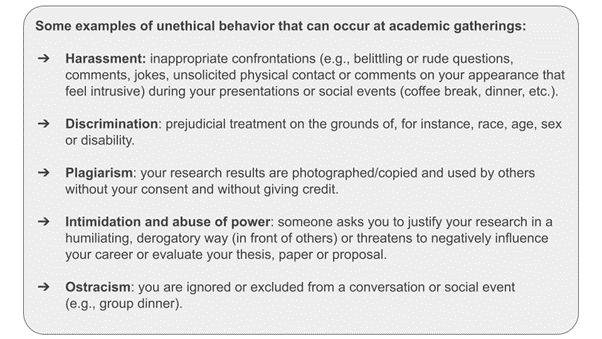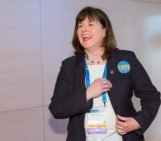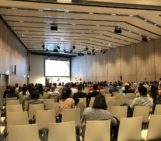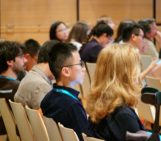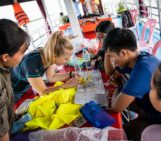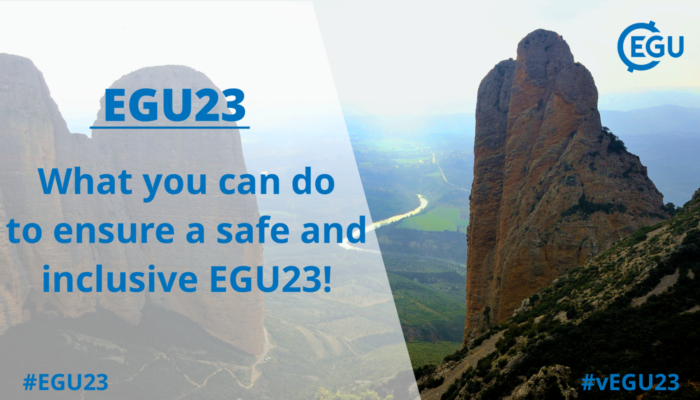
It is true that academic gatherings like scientific conferences can offer great opportunities for career advancement, such as building stronger networks, highlighting your research, and finding new opportunities for collaboration. Unfortunately, many conferences are not equally inclusive to all (see the image below) and can pose as unsafe environments for presenters and participants. With EGU23 only a few weeks away, here are some of the ways you can stay vigilant of and report any unethical behaviour at the conference. We need your help to ensure a safe and inclusive environment for people of every background!
What is unethical behaviour and how does it impact conference attendees?
Various forms of unethical behaviour can and do occur during conferences (Biggs et al., 2018; Settles and O’Connor, 2014) and their severity can be of varying degrees. Often, it is challenging to recognize and interpret inappropriate, disrespectful, abusive, or discriminatory situations — both for those who are the target of such behaviour and for those who witness these events (i.e., bystanders). The risk or fear of retaliation for speaking up against such behaviour results in most incidents going unreported and without any consequences for the aggressor(s).
Unethical behaviour such as discrimination and other incivilities have long-lasting effects on those who experience them, and these situations impact the scientific community as a whole. Those who have experienced unethical behaviour (the section below has some examples) may engage less in environments where such aggressions take place and as a result, avoid conferences altogether. Consequently, unethical behaviour occurring during conferences can contribute to the continued exclusion of under-represented groups in the geosciences, given that at meetings women experience greater rates of discrimination than men (Popp et al., 2019), and women with intersectional identities (e.g., Black, Indigenous, People of Colour or LGBTQ+) are disproportionately affected (National Academies of Sciences, Engineering, and Medicine, 2018).
Creating and maintaining an inclusive environment for everyone is a moral imperative that requires everyone’s effort! To do so, we
1) need to recognize and contextualize unethical behaviour when it occurs (Box 1),
2) know what we can do if we experience it ourselves or as bystanders (Box 2), and
3) start reporting incidents to hold the aggressors accountable (Box 3).
How does EGU ensure an inclusive environment?
EGU is committed to creating an inclusive, safe, and respectful environment during its virtual and on-site meetings. For instance, EGU provides accessibility for colleagues with disabilities and facilitates access to day-care — support that is often missing at conferences (Trewin et al., 2019; WID, 2022). Everyone participating in EGU activities is required to adhere to the EGU Code of Conduct, which sets the standard of expected and required ethical behaviour for any EGU member: any kind of discrimination, harassment, bullying, coercion, intimidation, censorship and plagiarism is considered misconduct and will not be tolerated.
It is important to know that the EGU Code of Conduct does not only apply to EGU meetings, but to all EGU activities including the EGU journals, so it also applies to everyone involved in the publication process (i.e., editors, reviewers, authors). Moreover, it also applies to everyone involved in the process of nominating and selecting EGU Medals and Awards, EGU officers, medallists and awardees. Consequently, the EGU Code of Conduct promotes ethical behaviour and an inclusive and constructive approach to science across all EGU activities.
If you experience any form of misconduct related to any EGU activities, please feel encouraged to report this to EGU (see Box 3).
BOX 1:
Do you recognize unethical behaviour such as harassment or incivilities?
Harassment and incivilities can stem from discrimination against sex, race, colour and national origin, religion, age, disability, sexual orientation and/or pregnancy and parental status (note: this list is non-exhaustive). Incivilities can also be caused by competition and envy among scientists, perceived feelings of injustice, mental distress or being a victim of aggression, among other reasons (e.g., Torkelson et al., 2016).
Harassment and uncivil behaviour has many faces and typically involve a form of hostile, unwanted or belittling verbal or physical behaviour towards another person or group of persons. This conduct can be intentional or unintentional and behaviours range from more subtle micro-aggressions (see this tool or this short YouTube video to recognize and understand micro-aggressions) to explicit bullying and harassment.
BOX 2:
What can you do if you experience unethical behaviour during the EGU General Assembly? (inspired by the toolkit of the New York University, Academic Bystander Working Group)
- Stay calm and assess the situation (Is the question/behaviour appropriate? How does it make you feel?).
- Look for allies and active bystanders! If you feel unsafe intervening yourself, there may be others that can provide support. For instance, try making eye contact with friendly colleagues or the session convener.
- Remember: if you are presenting your work, you as a speaker are in control! Know that you are not obliged to engage with insulting or condescending questions/comments.
- If you feel safe and comfortable enough, set your own boundaries. You can react to an inappropriate question/comment with the following counter-questions/comments:
- “Do I understand correctly that you think …”,
- “Why do you think that this is relevant to my study?”
- “I do not see your point / do not understand your question. Can you please explain your main point and why this is pertinent to this discussion?”
- You can also diffuse the situation:
- You may reply that you will get back to them later (e.g., as answering their question would go into too much detail at the moment and that you want to give others the chance to ask questions too.)
- You can also disrupt such situations by reinforcing the main focus of your research, thereby dismissing the question.
- We strongly recommend writing down what happened in as much detail as possible: What happened and when did it happen? Who was present and witnessed the situation? How did you react and how did the situation make you feel? This can be difficult to do alone, so you might sit down with a trusted person (friend, family, a trusted colleague, etc.). Such a document will help you think about ways to handle such situations in the future and clarify for yourself whether you wish to report the incident to the EGU (see Box 3).
- More examples by the Academic Bystander Working Group @NYU, including regarding sexual harassment, can be found here.
How can you be an ally and active bystander?
- Stay calm and assess the situation.
- Be respectful and constructive.
- Be aware of your own biases and counter them.
- Make space for others if you feel they are not being heard.
- Follow one or more of the 5 Ds of Bystander Intervention (adopted from ADVANCEGeo Partnership, 2018 link; Figure 3)
BOX 3:
How can you report incidents?
Issues of any form of unethical behaviour occurring during EGU activities can be reported to conduct@egu.eu at any time. Any information sent to this address is read by the EGU President and the EGU Person of Trust, who treat all information as confidential. The reporting person can expect a reply within ten business days. Additionally, each General Assembly has a Meeting Person of Trust whom you can find at the meeting’s Information Desk.
For more information regarding equity and workplace climate in the geosciences, please visit the ADVANCEGeo Partnership website which provides numerous helpful resources and links to relevant literature. The EGU Blog Post “Mind your Head: An introduction to Workplace Bullying in Academia” by Pieber et al., 2021 or the EOS article “How to Combat Bullying and Discrimination in the Geosciences” by Popp et al., 2020 offer more general tips and information about discrimination in academia.
Adam Grant’s podcast “WorkLife” offers great insight into building inclusive workspaces (check out episodes 5.4 “How to Build an Inclusive Workplace”, 4.9 “How to Bust Bias at Work” or 4.12 “Is it Safe to Speak Up at Work?”). The “Dare to Lead” podcast with Brene Brown offers more amazing conversations about workplace culture (e.g., episodes “Inclusion on Purpose”, “Why Every Leader Needs to Worry About Toxic Culture” or “How Toxic Work Cultures Are Driving the Great Resignation”).
Contributed by:
Andrea L. Popp* (Hydrology Research, Swedish Meteorological and Hydrological Institute (SMHI), Sweden & Department of Geosciences, University of Oslo, Norway),
Simone M. Pieber (Empa, Laboratory for Air Pollution and Environmental Technology, Switzerland),
Munira Raji* (Department of Geography, Geology & Environment, University of Hull, UK),
Mengze Li^ (Climate and Space Sciences and Engineering, University of Michigan, USA)
Derya Guerer (The University of Queensland, Australia)
Anita Di Chiara* (INGV of Rome, Italy)
Anouk Beniest* (Department of Earth Sciences, Vrije Universiteit Amsterdam, the Netherlands)
* member of the EGU Equality, Diversity and Inclusion (EDI) working group
^ Atmospheric Sciences Division ECS representative
References
ADVANCEGeo Partnership (2018) Strategies for Responding to Harassment and Hostile Climates (last accessed on March 24, 2022)
Biggs, J., Hawley, P. H., and Biernat, M. (2018) The Academic Conference as a Chilly Climate for Women: Effects of Gender Representation on Experiences of Sexism, Coping Responses, and Career Intentions. Sex Roles, 78(5–6), 394–408.
EGU (2020) Code of conduct (last accessed on March 24, 2022)
Did this really happen?! (2018) Conference wake up, Did this really happen?! (last accessed on March 29, 2022)
National Academies of Sciences, Engineering, and Medicine (2018) Sexual Harassment of Women: Climate, Culture, and Consequences in Academic Sciences, Engineering, and Medicine. Washington, DC: The National Academies Press.
New York University, Academic Bystander Working Group (2022) Toolkit for Conference Upstanders (last accessed on March 24, 2022)
Pendergrass et al (2019) Guide to Organizing Inclusive Scientific Meetings: Where to Start, 500 Women Scientists, (last accessed on March 24, 2022)
Pieber, S., van Rijsingen, E., Gürer, D. and Beniest, A. (2021) Mind your Head: An introduction to Workplace Bullying in Academia, EGU Blog Mind Your Head, (last accessed on March 29, 2022)
Popp, A. L.; Lutz, S. R.; Khatami, S.; van Emmerik, T. H. M.; Knoben, W. J. M. (2019) A global survey on the perceptions and impacts of gender inequality in the earth and space sciences, Earth and Space Science, 6(8), 1460-1468,
Popp, A.L., Hall, C. and Yilmaz, Y. (2020) How to combat bullying and discrimination in the geosciences, Eos, 101,
Settles, I. H., and O’Connor, R. C. (2014) Incivility at academic conferences: Gender differences and the mediating role of climate. Sex Roles,71(1-2), 71–82.
Torkelson, E., Holm, K., Bäckström, M., and Schad, E. (2016) Factors contributing to the perpetration of workplace incivility: the importance of organizational aspects and experiencing incivility from others. Work and stress, 30(2), 115–131.
Trewin, S., Hanson, V., Rode, J., Mankoff, J., Brady, E., Ringel Morris, M., Fitzpatrick, D., Hwang, F. (2019). Accessible Conference Guide, (last accessed on March 24, 2022)
WID (World Institute on Disability) (2022) Conference Accessibility Resource Library, (last accessed on March 24, 2022)


